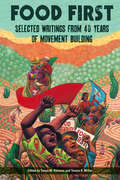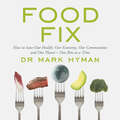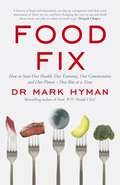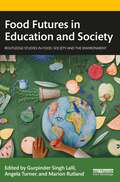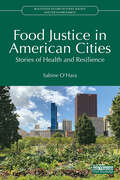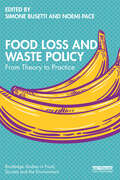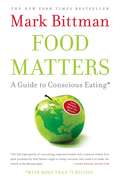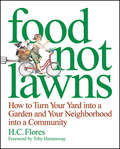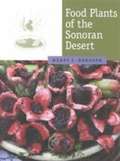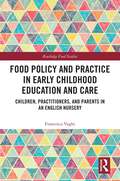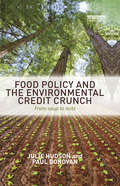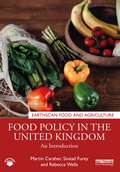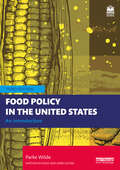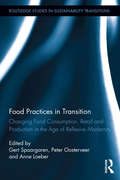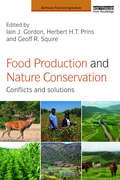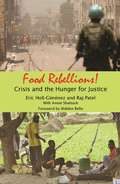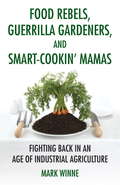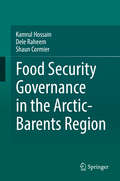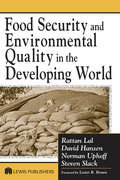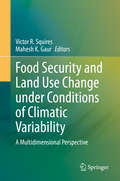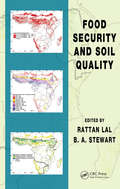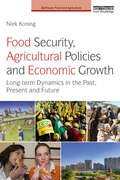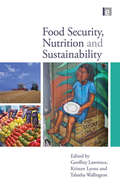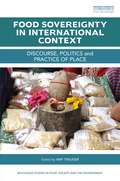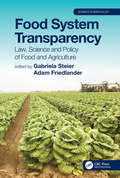- Table View
- List View
Food First: Selected Writings from 40 Years of Movement Building
by Tanya M Kerssen Teresa K MillerThis book looks back on forty years of writings from the Oakland-based Institute for Food and Development Policy, better known as Food First, on the occasion of its 40th anniversary. The book highlights the breadth and depth of the organization's published works, addressing issues such as hunger, international trade, US foreign policy, the Green Revolution, agroecology, climate justice, land reform, food and farm workers' rights, and food sovereignty.
Food Fix: How to Save Our Health, Our Economy, Our Communities and Our Planet – One Bite at a Time
by Mark HymanOur most powerful tool to reverse the global epidemic of chronic disease, heal the environment, reform politics, and revive economies is food. What we eat has tremendous implications not just for our waistlines, but also for the planet, society, and the global economy. What we do to our bodies, we do to the planet; and what we do to the planet, we do to our bodies.In Food Fix Mark Hyman explains how our food and agriculture policies are corrupted by money and lobbies that drive our biggest global crises: the spread of obesity and food-related chronic disease, climate change, poverty, violence, educational achievement gaps, and more. He provides solutions for citizens, businesses, and policy makers to create a healthier world, society, and planet.Pairing the latest developments in nutritional and environmental science with an unflinching look at the dark realities of the global food system and the policies that make it possible, Food Fix is a passionate call to arms that will change the way you think about - and eat - food forever.(P) 2020 Hachette Audio
Food Fix: How to Save Our Health, Our Economy, Our Communities and Our Planet – One Bite at a Time
by Mark HymanOur most powerful tool to reverse the global epidemic of chronic disease, heal the environment, reform politics, and revive economies is food. What we eat has tremendous implications not just for our waistlines, but also for the planet, society, and the global economy. What we do to our bodies, we do to the planet; and what we do to the planet, we do to our bodies.In Food Fix, New York Times best-selling author Mark Hyman explains how food and agriculture policies are corrupted by money and are driving a global crises: the spread of obesity and food-related chronic disease, climate change, poverty, violence, educational achievement gaps, and more. He provides solutions for citizens, businesses, and policy makers to create a healthier world, society, and planet.Pairing the latest developments in nutritional and environmental science with an unflinching look at the dark realities of the global food system and the policies that make it possible, Food Fix is a passionate call to arms that will change the way you think about - and eat - food forever.'If you're overwhelmed by the scale of the world's problems, and wondering what you can do in your own life to start, Food Fix is for you. Dr. Hyman deftly connects the dots between education, health, climate science, and the food we eat every day, showing that the choices we make about the food we put on our plates has consequences that ripple around the world.' - Arianna Huffington
Food Futures in Education and Society (Routledge Studies in Food, Society and the Environment)
by Angela Turner Gurpinder Singh Lalli Marion RutlandThis book brings together a unique collection of chapters to facilitate a broad discussion on food education that will stimulate readers to think about key policies, recent research, curriculum positions and how to engage with key stakeholders about the future of food. Food education has gained much attention because the challenges that influence food availability and eating in schools also extend beyond the school gate. Accordingly, this book establishes evidence-based arguments that recognise the many facets of food education, and reveal how learning through a future's lens and joined-up thinking is critical for shaping intergenerational fairness concerning food futures in education and society. This book is distinctive through its multidisciplinary collection of chapters on food education with a particular focus on the Global North, with case studies from England, Australia, the Republic of Ireland, the United States of America, Canada and Germany. With a focus on three key themes and a rigorous food futures framework, the book is structured into three sections: (i) food education, pedagogy and curriculum, (ii) knowledge and skill diversity associated with food and health learning and (iii) food education inclusivity, culture and agency. Overall, this volume extends and challenges current research and theory in the area of food education and food pedagogy and offers insight and tangible benefits for the future development of food education policies and curricula. This book will be of great interest to students, scholars, policymakers and education leaders working on food education and pedagogy, food policy, health and diet and the sociology of food.
Food Justice in American Cities: Stories of Health and Resilience (Routledge Studies in Food, Society and the Environment)
by Sabine O’HaraThis book documents food insecurity in urban communities across the United States and asks whether emerging urban food and agriculture initiatives can address the food security needs of American city dwellers. While America has sufficient food to feed its entire population, 38 million people are food insecure, with urban communities and communities of color having long borne the brunt of food inequalities. This book traces the evolving story of food by describing the people behind food system statistics, focusing on cities and suburban communities across America. In doing so, it raises questions not only about food security but about a food economy that can foster justice and sustainability and combat hunger and waste. By linking human faces to the data, the book reveals the many connections between food insecurity and unsustainable practices. The book concludes by discussing some of the pathways toward a more sustainable and just food system by linking the food system to the larger economy and the many sectors that are connected to food. Because of these multifaceted connections, food can be a unique catalyst for creating pathways toward a more just and sustainable economy that is more aligned with nature. This book will be of great interest to students and scholars of food justice, food security, urban food and agriculture, urban sustainability, and sustainable food systems more broadly.
Food Loss and Waste Policy: From Theory to Practice (Routledge Studies in Food, Society and the Environment)
by Simone Busetti Noemi PaceThis book examines policy responses to food waste and loss, an issue of significant, global concern, with one-third of food produced for human consumption lost or wasted. Investigating food waste and loss under an interdisciplinary lens, the contributors employ a variety of methodological approaches, including quantitative and qualitative techniques, drawing on in-depth case studies and action research. The volume is organised into four parts: Understanding Food Loss and Waste, International Programmes, National Policies and Local Initiatives. The first part introduces the reader to the concept of food loss and waste, how it can be measured, its causes and consequences, and how it can be reduced. The second part is dedicated to international and cross-country case studies, with six chapters reviewing national policies implemented in France, Italy, Romania, Japan, China and the United States. In Part Four, three chapters are dedicated to local food recovery and redistribution initiatives. By focusing on different territories and different levels of governance, the book provides a detailed evaluation of food loss and waste policies, the barriers and opportunities of implementing the policies, as well as the impact they are actually having. The chapters are both descriptive and evaluative and draw out lessons for designing, implementing and reforming programmes. This book will be of great interest to students and scholars working on food waste, food policy, sustainable food systems, agricultural production and supply chains and public policy, as well as policymakers involved with developing and implementing programmes and policies to regulate and reduce food waste and loss.
Food Matters: A Guide to Conscious Eating with More Than 75 Recipes
by Mark BittmanFrom the award-winning champion of culinary simplicity who gave us the bestselling How to Cook Everything and How to Cook Everything Vegetarian comes Food Matters, a plan for responsible eating that's as good for the planet as it is for your weight and your health. We are finally starting to acknowledge the threat carbon emissions pose to our ozone layer, but few people have focused on the extent to which our consumption of meat contributes to global warming. Think about it this way: In terms of energy consumption, serving a typical family-of-four steak dinner is the rough equivalent of driving around in an SUV for three hours while leaving all the lights on at home. Bittman offers a no-nonsense rundown on how government policy, big business marketing, and global economics influence what we choose to put on the table each evening. He demystifies buzzwords like "organic," "sustainable," and "local" and offers straightforward, budget-conscious advice that will help you make small changes that will shrink your carbon footprint -- and your waistline. Flexible, simple, and non-doctrinaire, the plan is based on hard science but gives you plenty of leeway to tailor your food choices to your lifestyle, schedule, and level of commitment. Bittman, a food writer who loves to eat and eats out frequently, lost thirty-five pounds and saw marked improvement in his blood levels by simply cutting meat and processed foods out of two of his three daily meals. But the simple truth, as he points out, is that as long as you eat more vegetables and whole grains, the result will be better health for you and for the world in which we live. Unlike most things that are virtuous and healthful, Bittman's plan doesn't involve sacrifice. From Spinach and Sweet Potato Salad with Warm Bacon Dressing to Breakfast Bread Pudding, the recipes in Food Matters are flavorful and sophisticated. A month's worth of meal plans shows you how Bittman chooses to eat and offers proof of how satisfying a mindful and responsible diet can be. Cheaper, healthier, and socially sound, Food Matters represents the future of American eating.
Food Not Lawns
by H. C. FloresGardening can be a political act. Creativity, fulfillment, connection, revolution-it all begins when we get our hands in the dirt. "Food Not Lawns" combines practical wisdom on ecological design and community-building with a fresh, green perspective on an age-old subject. Activist and urban gardener Heather Flores shares her nine-step permaculture design to help farmsteaders and city dwellers alike build fertile soil, promote biodiversity, and increase natural habitat in their own "paradise gardens. " But "Food Not Lawns" doesn't begin and end in the seed bed. This joyful permaculture lifestyle manual inspires readers to apply the principles of the paradise garden--simplicity, resourcefulness, creativity, mindfulness, and community-to all aspects of life. Plant "guerilla gardens" in barren intersections and medians; organize community meals; start a street theater troupe or host a local art swap; free your kitchen from refrigeration and enjoy truly fresh, nourishing foods from your own plot of land; work with children to create garden play spaces. Flores cares passionately about the damaged state of our environment and the ills of our throwaway society. In "Food Not Lawns," she shows us how to reclaim the earth one garden at a time.
Food Plants of the Sonoran Desert
by Wendy C. HodgsonThe seemingly inhospitable Sonoran Desert has provided sustenance to indigenous peoples for centuries. Although it is to all appearances a land bereft of useful plants, fully one-fifth of the desert's flora are edible. This volume presents information on nearly 540 edible plants used by people of more than fifty traditional cultures of the Sonoran Desert and peripheral areas. Drawing on thirty years of research, Wendy Hodgson has synthesized the widely scattered literature and added her own experiences to create an exhaustive catalog of desert plants and their many and varied uses. Food Plants of the Sonoran Desert includes not only plants such as gourds and legumes but also unexpected food sources such as palms, lilies, and cattails, all of which provided nutrition to desert peoples. Each species entry lists recorded names and describes indigenous uses, which often include nonfood therapeutic and commodity applications. The agave, for example, is cited for its use as food and for alcoholic and nonalcoholic beverages, syrup, fiber, cordage, clothing, sandals, nets, blankets, lances, fire hearths, musical instruments, hedgerows, soap, and medicine, and for ceremonial purposes. The agave entry includes information on harvesting, roasting, and consumption-and on distinguishing between edible and inedible varieties. No other source provides such a vast amount of information on traditional plant uses for this region. Written to be easily accessible to general readers, the book is an invaluable compendium for anyone interested in the desert's hidden bounty.
Food Policy and Practice in Early Childhood Education and Care: Children, Practitioners, and Parents in an English Nursery (Routledge Food Studies)
by Francesca VaghiThis book is about food and feeding in early childhood education and care, offering an exploration of the intersection of children’s food, education, family intervention, and public health policies. The notion of ‘good’ food for children is often communicated as a matter of common sense by policymakers and public health authorities; yet the social, material, and practical aspects of feeding children are far from straightforward. Drawing on a detailed ethnographic study conducted in a London nursery and children’s centre, this book provides a close examination of the practices of childcare practitioners, children, and parents, asking how the universalism of policy and bureaucracy fits with the particularism of feeding and eating in the early years. Looking at the unintended consequences that emerged in the field, such as contradictory public health messaging and arbitrary policy interventions, the book reveals the harmful assumptions about disadvantaged groups that are perpetuated in policy discourse, and challenges the constructs of individual choice and responsibility as main determinants of health. Children’s food practices at the nursery are examined to explore the notion that, whilst for adults it is what children eat that often matters most, to children it is how they eat that is more important. This book contributes to a growing body of literature evidencing how children’s food is a contested domain, in which power relations are continuously negotiated. This raises questions not only on how children can be included in policy beyond a tokenistic involvement but also on what children’s well-being might mean beyond the biomedical sphere. The book will particularly appeal to students and scholars in food and health, food policy, childhood studies, and medical anthropology. Policymakers and non-governmental bodies working in the domains of children’s food and early years policies will also find this book of interest.
Food Policy and the Environmental Credit Crunch: From Soup to Nuts
by Paul Donovan Julie HudsonThe changing economic environment for the consumer that is emerging from the wreckage of the financial credit crunch plays directly into the importance of food spending. This is certainly true from the perspective of food prices in the short run, but also from the perspective of sustainability and reducing the impact of the environmental credit crunch. The economic changes we experience now have a bearing on our ability to manage the environmental credit crunch that looms. Food Policy and the Environmental Credit Crunch: From Soup to Nuts elaborates on the issues addressed in the authors’ first book, From Red to Green?,and asks whether the financial credit crunch could ameliorate or exacerbate the emergent environmental credit crunch. The conclusion drawn here is that a significant and positive difference could be made by changing some of the ways in which we procure, prepare, and consume our food. Written by an economist and an investment professional, this book addresses the economic and environmental implications of how we treat food. The book examines each aspect of the ‘food chain’, from agriculture, to production and processing, retail, preparation, consumption and waste.
Food Policy in the United Kingdom: An Introduction (Earthscan Food and Agriculture)
by Rebecca Wells Martin Caraher Sinéad FureyThis book provides an introduction to food policy in the United Kingdom, examining policy development, implementation, influences and current issues. The book begins by providing a wide-ranging introduction to food policy in the UK, situating it within wider global debates and establishing key drivers, such as issues related to global citizenship, trade and finance. The use of food control as a policy lever is also discussed and contrasted with alternative approaches based on behaviour change. The book presents an overview of the history of UK food policy, from which there is much to be learned, before moving onto current challenges posed by political instability, both at home and abroad, global pandemics and cost of living crises. Foremost is the need to manage public health, including both malnutrition and obesity, while promoting sustainable and healthy diets, as well as the broader issues around addressing food security and food poverty. The book also examines public sector food initiatives, such as school food and early childhood provisions, and food regulation. As a part of food regulation, chapters examine food scares and food fraud, from chalk in flour to "horsegate". The role of media, marketing and advertising is also considered within a policy perspective. Taking a wider lens, the book also discusses the impact of global food trade and the financialisation of food on food policy in the UK and vice versa. The book is supported by instructor eResources on the Routledge website designed to support student learning as well as provide regular updates on UK food policy developments. The eResources include student activities, group exercises and links to further reading and additional resources. This book serves as a key introduction to UK food and agricultural policy for students, scholars, policymakers and professionals, as well as those interested in food systems, public health and social policy more widely.
Food Policy in the United States: An Introduction (Earthscan Food and Agriculture)
by Parke WildeThis third edition of Food Policy in the United States offers a timely update to the leading textbook dedicated to all aspects of food policy in the United States.This book begins with the economic interests of farmers and food producers and then moves on to examine nutrition policy, food justice, food security, and the environment. Finding motivation in real-world controversies and debates, chapters cover domestic agriculture, international agricultural trade, food and beverage manufacturing, food retail and restaurants, food safety, dietary guidance, food labeling, advertising, and federal food assistance programs for the poor. Building on the success of the second edition, which received the Distinguished Quality of Communication award from the Agricultural and Applied Economics Association (AAEA), this new edition has been revised and updated, offering greater attention both to food justice issues, and to economic methods. It covers policy changes since the 2018 Farm Bill, the publication of the 2020–2025 Dietary Guidelines for Americans, the 2021 update to the "Thrifty Food Plan", and President Donald Trump's approach to food and agricultural trade. The impact of COVID-19 and the continuing climate crisis are examined, alongside stalled child nutrition reauthorization legislation, reforms in food-labeling, and immigration policy. The online Instructor and Student Resources include supplemental economic appendices, problem sets, activities, and exercises: www.routledge.com/cw/Wilde. This book makes U.S. food policy more comprehensible to those inside and outside the agri-food sector whose interests and aspirations have been ignored.This book is essential reading for all students, researchers, and policymakers seeking to understand U.S. food policy from a wide range of interdisciplinary backgrounds, including food studies, agricultural and food economics and policy, public health and nutrition, and public policy.
Food Practices in Transition: Changing Food Consumption, Retail and Production in the Age of Reflexive Modernity (Routledge Studies in Sustainability Transitions)
by Gert Spaargaren Peter Oosterveer Anne LoeberThis edited volume presents and reflects upon empirical evidence of ‘sustainability’-induced and -related transition in food practices. The material collected in the various chapters contributes to our understanding of the ways in which ideas and preferences, sociotechnological developments and changes in the governance of food interact and become visible in practices of consumption, retail and production.
Food Production and Nature Conservation: Conflicts and Solutions (Earthscan Food and Agriculture)
by Iain J. Gordon Herbert H.T. Prins Geoff R. SquireFeeding the world's growing human population is increasingly challenging, especially as more people adopt a western diet and lifestyle. Doing so without causing damage to nature poses an even greater challenge. This book argues that in order to create a sustainable food supply whilst conserving nature, agriculture and nature must be reconnected and approached together. The authors demonstrate that while the links between nature and food production have, to some extent, already been recognized, until now the focus has been to protect one from the impacts of the other. Instead, it is argued that nature and agriculture can, and should, work together and ultimately benefit from one another. Chapters describe efforts to protect nature through globally connected protected area systems and illustrate how farming methods are being shaped to protect nature within agricultural systems. The authors also point to many ways in which nature benefits agriculture through the ecosystem services it provides. Overall, the book shows that nature conservation and food production must be considered as equally important components of future solutions to meet the global demand for food in a manner that is sustainable for both the human population and the planet as a whole.
Food Rebellions
by Raj Patel Eric Holt-GimenezToday there are over a billion hungry people on the planet, more than ever before in history. While the global food crisis dropped out of the news in 2008, it returned in 2011 (and is threatening us again in 2012) and remains a painful reality for the world's poor and underserved. Why, in a time of record harvests, are a record number of people going hungry? And why are a handful of corporations making record profits? In Food Rebellions! Crisis and the Hunger for Justice, authors Eric Holt-Giménez and Raj Patel with Annie Shattuck offer us the real story behind the global food crisis and document the growing trend of grassroots solutions to hunger spreading around the world.Food Rebellions! contains up to date information about the current political and economic realities of our food systems. Anchored in political economy and an historical perspective, it is a valuable academic resource for understanding the root causes of hunger, growing inequality, the industrial agri-foods complex, and political unrest. Using a multidisciplinary approach, Holt-Giménez and Patel give a detailed historical analysis of the events that led to the global food crisis and document the grassroots initiatives of social movements working to forge food sovereignty around the world. These social movements and this inspiring book compel readers to confront the crucial question: Who is hungry, why, and what can we do about it?
Food Rebels, Guerrilla Gardeners, and Smart-Cookin' Mamas
by Mark WinneIn an age of uncertainty about how climate change may affect the global food supply, industrial agribusiness promises to keep the world fed. Through the use of factory "farms," genetic engineering, and the widespread application of chemicals, they put their trust in technology and ask consumers to put our trust in them. However, a look behind the curtain reveals practices that put our soil, water, and health at risk. What are the alternatives? And can they too feed the world? The rapidly growing alternative food system is made up of people reclaiming their connections to their food and their health. A forty-year veteran of this movement, Mark Winne introduces us to innovative "local doers" leading the charge to bring nutritious, sustainable, and affordable food to all. Heeding Emerson's call to embrace that great American virtue of self-reliance, these leaders in communities all across the country are defying the authority of the food conglomerates and taking matters into their own hands. They are turning urban wastelands into farms, creating local dairy collectives, preserving farmland, and refusing to use genetically modified seed. They are not only bringing food education to children in elementary schools, but also offering cooking classes to adults in diabetes-prone neighborhoods--and taking the message to college campuses as well. Such efforts promote food democracy and empower communities to create local food-policy councils, build a neighborhood grocery store in the midst of a food desert, or demand healthier school lunches for their kids. Winne's hope is that all of these programs, scaled up and adopted more widely, will ultimately allow the alternative food system to dethrone the industrial. Food Rebels, Guerrilla Gardeners, and Smart-Cookin' Mamas challenges us to go beyond eating local to become part of a larger solution, demanding a system that sustains body and soul.
Food Security Governance in the Arctic-Barents Region
by Kamrul Hossain Dele Raheem Shaun CormierFood Security Governance in the Arctic-Barents Region provides a multidisciplinary perspective on the major food security and safety challenges faced in the Arctic region. The authors address existing gaps in current knowledge of the coordination and implementation of legal framework and policy that affects the Arctic. The volume is unique in its focus on the Barents region, an area of northern Europe containing Norway, Sweden, Finland and Russia. The region has a population of approximately 5.2 million, including indigenous and non-indigenous peoples. The authors offer a balanced and systemic review of the role of traditional foods in this region, along with an overview of the regulatory tools and institutions that govern food security. Food security and safety in the –Arctic-Barents region is connected to and impacted by transformations from both inside and outside the area. Climate change, globalization and human activities affect the availability, accessibility, and affordability of food. The result of these transformations has an impact on the food security and safety for both indigenous and non-indigenous individuals and communities. The authors, by highlighting these challenges, reveal the importance of having harmonized policies and legal tools in place in order to strengthen food security and safety in the Barents region. The book forms part of the main outcome of the Academy of Finland’s ongoing project on Human Security as a promotional tool for societal security in the Arctic: Addressing Multiple Vulnerability to its Population with Specific Reference to the Barents Region (HuSArctic). Researchers, policy makers, and other stakeholders will find the book to be an important contribution to the promotion of policies and strategies on food security.
Food Security and Environmental Quality in the Developing World
by David Hansen Rattan Lal Norman Uphoff Steven SlackCan developing countries meet the food requirements of their growing populations without jeopardizing a natural resource base that is already under great stress?Can increases in food production achieved in the past two decades be sustained in the next two decades?Can developing countries achieve freedom from hunger and malnutrition
Food Security and Land Use Change under Conditions of Climatic Variability: A Multidimensional Perspective
by Victor R. Squires Mahesh K. GaurThis volume analyzes the global challenges of food security, land use changes, and climate change impacts on food production in order to recommend sustainable development policies, anticipate future food services and demands, and identify the economic benefits and trade-offs of meeting food security demands and achieving climate change mitigation objectives. The key points of analysis that form the conclusions of this book are based on measuring the quantity and quality of land and water resources, and the rate of use of sustainable management of these resources in the context of socio-economic factors, including food security, poverty, and climate change impacts. In six parts, readers will learn about these crucial dimensions of the affects of climate change on food security, and will gain a better understanding of how to assess the trade-offs when combating multiple climate change challenges and how to develop sustainable solutions to these problems. The book presents multidimensional perspectives from expert contributors, offering holistic and strategic approaches to link knowledge on climate change and food security with action in the form of policy recommendations, with a focus on sociological and socio-economic components of climate change impacts. The intended audience of the book includes students and researchers engaged in climate change and food security issues, NGOs, and policy makers.
Food Security and Soil Quality (Advances in Soil Science)
by Paul C. H. LiJust five years ago, it was generally believed that the number of food insecure people in the world was on continuous decline. Unfortunately, widespread soil degradation along with resistance to recommended agronomic practices, and little attempt to restore degraded soils have conspired with significant droughts (in regions that could least tolerat
Food Security, Agricultural Policies and Economic Growth: Long-term Dynamics in the Past, Present and Future (Earthscan Food and Agriculture)
by Niek KoningUsing a political-economic approach supplemented with insights from human ecology, this volume analyzes the long-term dynamics of food security and economic growth. The book begins by discussing the nature of preindustrial food crises and the changes that have occurred since the 19th century with the ascent of technical science and the fossil fuel revolution. It explains how these changes improved living standards but that the realization of this improvement was usually dependent on government support for smallholder modernization. The author sets out how the evolution of food security in different regions has been influenced by farm policy choices and how these choices were shaped by local societal characteristics, international relations and changing configurations in metropolitan countries. Separate chapters are devoted to the interaction of this evolution with debates on food security and economic growth and with international economic policies. The final chapters highlight the new challenges for global food security that will arise as traditional sources of biomass production and the more easily extractable reserves of fossil biomass become depleted or can no longer be used. Overall, the book emphasizes the inadequacy of current explanations with regard to these challenges. It explores what is needed to ensure a sustainable future and calls for a rethinking of these issues; a necessary reflection in today's unstable global political situation.
Food Security, Nutrition and Sustainability
by Geoffrey Lawrence Kristen Lyons Tabatha WallingtonAs the threats of food insecurity loom ever larger, the world faces the sad irony of food shortages in the global South alongside a purported 'obesity epidemic' in the global North. The twin issues of food production and food access are of particular concern in the context of climate change, 'peak oil', biofuels, and land grabs by wealthy nations. Food Security, Nutrition and Sustainability offers critical insights by international scholars, with chapters on global food security, supermarket power, new technologies, and sustainability. The book also assesses the contributions of diet and nutrition research in building socially just and environmentally sustainable food systems and provides policy recommendations to improve the health and environmental status of contemporary agri-food systems. The book features contributions from a range of social science perspectives, including sociology, anthropology, public health and geography, with case study material drawn from throughout the world.
Food Sovereignty in International Context: Discourse, politics and practice of place (Routledge Studies in Food, Society and the Environment)
by Amy TraugerFood sovereignty is an emerging discourse of empowerment and autonomy in the food system with the development of associated practices in rural and some urban spaces. While literature on food sovereignty has proliferated since the first usage of the term in 1996 at the Rome Food Summit, most has been descriptive rather than explanatory in nature, and often confuses food sovereignty with other movements and objectives such as alternative food networks, food justice, or food self-sufficiency. This book is a collection of empirically rich and theoretically engaged papers across a broad geographical spectrum reflecting on what constitutes the politics and practices of food sovereignty. They contribute to a theoretical gap in the food sovereignty literature as well as a relative shortage of empirical work on food sovereignty in the global "North", much previous work having focussed on Latin America. Specific case studies are included from Canada, Norway, Switzerland, southern Europe, UK and USA, as well as Africa, India and Ecuador. The book presents new research on the emergence of food sovereignties. It offers a wide variety of empirical examples and a theoretically engaged framework for explaining the aims of actors and organizations working toward autonomy and democracy in the food system.
Food System Transparency: Law, Science and Policy of Food and Agriculture (Advances in Agroecology)
by Gabriela Steier Adam FriedlanderThis book brings together an international group of agriculture and food lawyers and scientists to define the field of Food System Transparency in three parts: the big picture, food safety and health, and the global view. Each part adds to the whole but zooms in through a unique lens. Investigating social, economic, political, scientific and legal frameworks, this comprehensive volume addresses topics such as food authenticity, agroecological evaluations, and consumer protection. Interwoven themes of transparency contextualize concepts of food safety, information sharing and regulatory opportunities at a local and global scale. Editors’ notes provide blended legal and scientific commentary to facilitate further discussion and context within the classroom. Advantages of this volume include: Chapters written by foremost international experts in their fields Editors’ notes written for classroom use and background information Figures and tables providing illustrations of important concepts Case studies delivering practicality and in-depth analysis to current events A special chapter on COVID-19 and its implications for the food system This book is important reading for graduate-level students, legal scholars, nonlegal academics, advocates for food system transparency and resilience, agroecology and environmental conservation, and practitioners in any cross-disciplinary areas relating to food policy. It will be of interest to all those who seek to deepen their understanding of the concepts and trends surrounding the information that centers around our food system, both domestically in the United States and the European Union, as well as in many major trading nations such as China.Check out the Support Materials tab on www.routledge.com/9780367440367 for a short video previewing some the key themes in the book.
